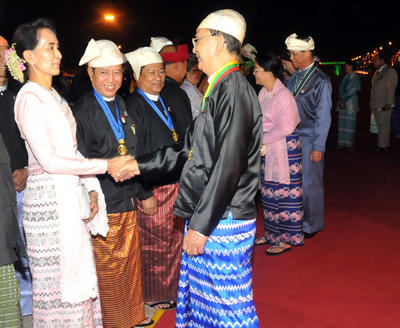, who took office in March 2011, and the core leadership team in his government. Their understanding of what’s at stake in restoring the political freedoms and economic prospects of the people of Myanmar and their commitment to tearing away the institutions of privileged power and rent-seeking that have been entrenched over the past 60 years — when you engage them eyeball to eyeball — is both impressive and deeply reassuring. Things will go wrong; but the bets at this stage must be on getting things roughly right.
Few anticipated the speed with which the commitment to move to civilian rule would roll forward. At the centre of the changes that have taken place are wide-ranging political and economic reforms that have encouraged the suspension of Western economic sanctions and a major drive to attract foreign investment to support rapid trade and economic growth. Economic reform is central to this process and will generate its own momentum, but at this time much hangs on the judgment and purpose of the present leadership as it steers a way through the transformation of old military allegiances and charts a course that cuts cronyism adrift and gets behind the next political leadership and the creation of a new democratic and economic system.
One external test along the road will be how Myanmar handles its role as Chair of ASEAN this year. As Eliane Coates says, as the ASEAN Chair Myanmar has an opportunity to discard its previously isolationist foreign policy and become a responsible stakeholder in the international community. This year is Naypyidaw’s turn to steer ASEAN in dealing with contentious regional issues, including the South China Sea disputes. Naypyidaw’s challenge now is to translate this ‘chairmanship’ into a commendable ‘leadership’ role. Moreover, ‘chairing ASEAN could potentially unlock greater economic opportunities for Myanmar. This includes growing investor confidence and further integration with ASEAN and the wider regional economic communities’.
While the economic payoffs from hosting ASEAN may be large, they will depend on further economic and political reform creating an environment that sets the stage for Myanmar’s full integration within the ASEAN Economic Community. Myanmar expects ASEAN to respect its political reform and national reconciliation efforts, as Coates points out, but ASEAN’s support of Myanmar’s democratisation will not be unconditional. Responsibility for the reputation of ASEAN provides a setting for creating pressure that is congenial to meeting both objectives.
Among the many internal tests will be how the fiefdoms of the rent-seeking society are ultimately brought to heel in serving the broader public interest. As Josh Wood explains, most of Myanmar’s tax base (and lucrative private revenue streams) from resource investment are outside the government’s central budgetary process. To deal with this problem, ‘[c]entral control of public finances must be asserted, the thousands of remaining “other” ministerial accounts need to be put on public record and SOEs should become liable to the same rules and taxes that apply to privately run firms’. Publishing each minister’s budget and the contracts they are responsible for with outside firms as well as the profits made by individual SOEs ‘would go a long way into moulding more accountable governance and more reliable revenues’.
What are the chances that, in the end, the military will not subvert Myanmar’s historic transformation?
This week’s lead essay from Adam MacDonald notes that Myanmar’s political and economic reforms have not yet intruded upon the security portfolios and the institutional independence of the military. ‘The military carefully cordoned off these realms via constitutional provisions before transferring power, effectively becoming a veto player in political proceedings’.
Many believe that the military’s early removal from the political apparatus is necessary for the country’s effective transition towards democracy. An interrelated issue is whether seeking justice for abuses committed during the military junta’s reign will be a priority for any future government. Over time, clearly a complete reformation of military-civilian relations will be required — with a shift of security authority from military to civilian control and a fundamental shift in the structure of the authority of the state. MacDonald asks whether the justice project is a prerequisite to entrenching democracy.
MacDonald’s conclusion seems wise: ‘Seeking justice is an important issue. But continued support for incremental change would most likely overrule such desires in the short to medium term. The eventual task of approaching the sensitive subject of the military’s political role and legacy will have to be managed in such a way as to create strong and cooperative relations with the military … [I]f any legal proceedings or tribunals occur — the aim is not about punishing the military as an institution’. Rather it should be about national reconciliation.
As has been argued elsewhere, Myanmar has many problems in committing to comprehensive economic and political reforms; in managing its fractious minority problems; and in building the human capital that will allow it to complete an enormously difficult and complex process. The major job is building the policy frameworks and the civil service infrastructure that ensures that the fruits of the early economic payoffs from reform are captured more broadly for the state and its people, and feed a self-sustaining process of high potential economic growth and the entrenchment of political freedoms a taste of which is in the air.
Peter Drysdale is Editor of the East Asia Forum.

